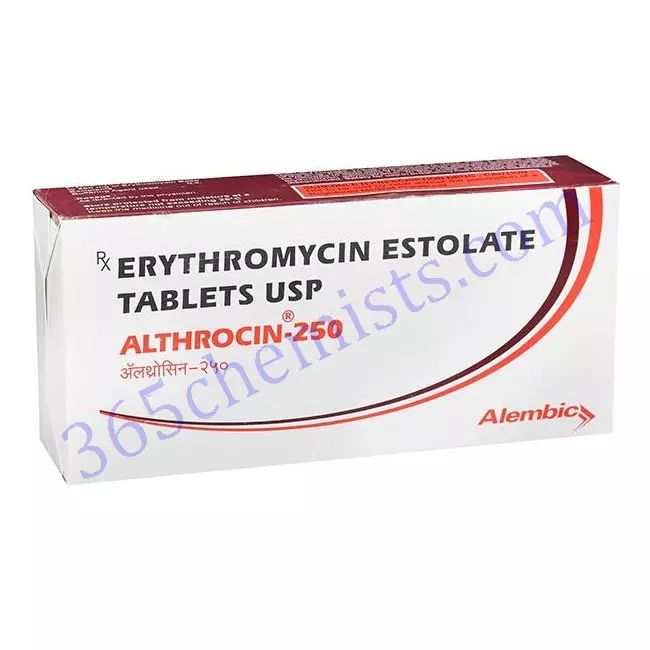Althrocin 250mg Tablet
Antibiotic medication known as Althrocin, which contains the active ingredient erythromycin in a dosage of 250 milligrammes, is commonly prescribed for the treatment of a wide variety of bacterial infections. This exhaustive description aims to provide helpful insights into the efficacy of Althrocin 250mg, its uses, and the potential adverse effects that may be experienced by using it.
Effectiveness of Althrocin 250mg
The 250 milligramme dose of althrocin is extremely effective against a wide variety of bacterial infections. It is an antibiotic of the macrolide class, and its mechanism of action involves the inhibition of bacterial protein synthesis. Erythromycin, which is the active component in Althrocin 250mg, has shown to be effective against a wide variety of Gram-positive bacteria, such as species of the genus Streptococcus and Staphylococcus.
Related Product
Althrocin 250mg Tablet
Althrocin 500mg Tablet
Uses of Althrocin 250mg
- Infections of the Respiratory Tract An althrocin dosage of 250 milligrammes is typically prescribed to treat infections of the respiratory tract, including pneumonia, bronchitis, and pertussis (whooping cough). It aids in the killing of the bacteria that are to blame for these infections and relieves the symptoms that are associated with them.
- Infections of the Skin and Soft Tissues: The dosage of 250 milligrammes of althrocin is recommended for the treatment of infections of the skin and soft tissues, such as cellulitis, erysipelas, and acne. It makes it easier to get rid of the infection and speeds up the healing process for the affected area.
- Infections Transmitted Sexually This dosage of Althrocin is effective against a variety of STDs, including chlamydia and syphilis, among others. Individuals who are unable to tolerate the effects of other antibiotics frequently benefit from this treatment option instead.
- Infections of the Gastrointestinal Tract A prescription for Althrocin 250 mg may be given to treat infections of the gastrointestinal tract that are caused by bacteria, including Campylobacter and Legionella. It aids in the elimination of the bacteria and provides relief for the symptoms that are associated with it, such as diarrhoea and abdominal pain.
Administration and Dosage
Tablets of Althrocin 250 mg can be purchased and should be swallowed either with or without food, depending on the instructions provided by the healthcare provider. The nature of the infection and its extent determine the appropriate dosage, as well as the length of time needed for treatment. Even if the symptoms improve, it is imperative to finish the entire prescribed course of medication in order to guarantee that the bacteria will be eliminated.
Side Effects of Althrocin 250mg
Even though Althrocin 250 mg is generally well tolerated, it still has the potential to bring on some adverse effects in some people. The symptoms of gastrointestinal distress, which can include nausea, vomiting, diarrhoea, and abdominal pain, are among the most common adverse effects. These adverse effects are typically mild and go away on their own without the need for any kind of medical intervention.
Other side effects, though less frequent, could include the following:
- Allergic Reactions: Althrocin 250mg has been linked to the development of allergic reactions in some people. These reactions can present themselves as a rash, itching, swelling, or difficulty breathing. If any of these symptoms manifest themselves, it is imperative that you seek immediate medical attention.
- Liver Toxicity Liver toxicity is a rare side effect that can be caused by taking Althrocin 250mg. Symptoms of liver toxicity include jaundice, dark urine, or abdominal pain. In the event that these symptoms manifest themselves, one should seek medical attention without delay.
- Individuals should consult their healthcare provider or refer to the medication’s package insert for a comprehensive understanding of potential adverse reactions. It is important to note that this list of side effects is not exhaustive; therefore, individuals should consult their healthcare provider.
Precautions and Considerations
- Individuals who have a known allergy to erythromycin or other macrolide antibiotics should steer clear of taking Althrocin 250mg if at all possible. This includes both children and adults. It is essential to provide the healthcare provider with information regarding any known allergies or sensitivities the patient may have.
- Interactions with Other Medications: There is a possibility that Althrocin 250 mg could interact with other medications, including statins, anticoagulants, and antifungal agents, which could potentially alter the effectiveness of those medications or increase the risk of their side effects. It is critical to keep the healthcare provider informed about any and all other medications, including over-the-counter medicines and dietary supplements made from natural ingredients, that are being taken at the same time.
- During Pregnancy and Breastfeeding: It is recommended that Althrocin 250mg be used with extreme caution so as not to cause any harm to the nursing baby. Before beginning treatment, the healthcare provider ought to be contacted so that a complete analysis of the potential benefits and drawbacks can be performed.
Conclusion
In the treatment of a variety of bacterial infections, an effective antibiotic such as Althrocin 250mg, also known as Erythromycin 250mg, is utilised. Infections of the skin and soft tissues, respiratory tract infections, sexually transmitted infections, and gastrointestinal infections are some of the conditions that benefit from this treatment option. However, it is essential to use Althrocin 250mg under the supervision of a medical professional, taking into account the possibility of adverse effects as well as the specifics of each individual patient. It is essential to consult a healthcare provider in order to receive individualised guidance, to be monitored and managed, and to deal with any potential adverse reactions or drug interactions.












